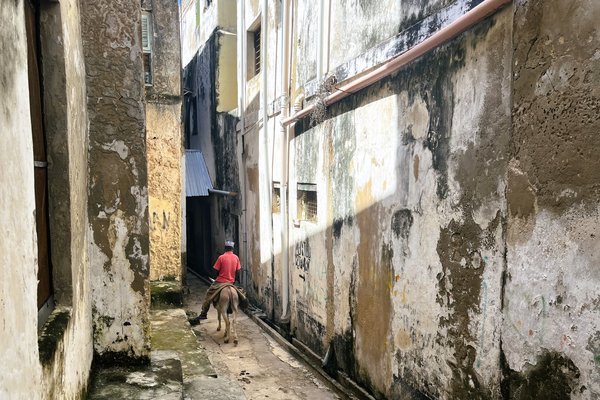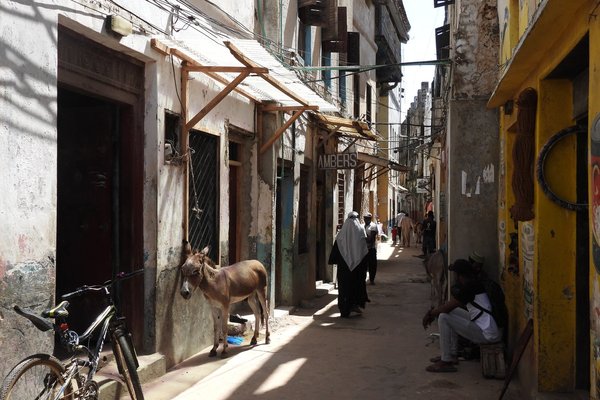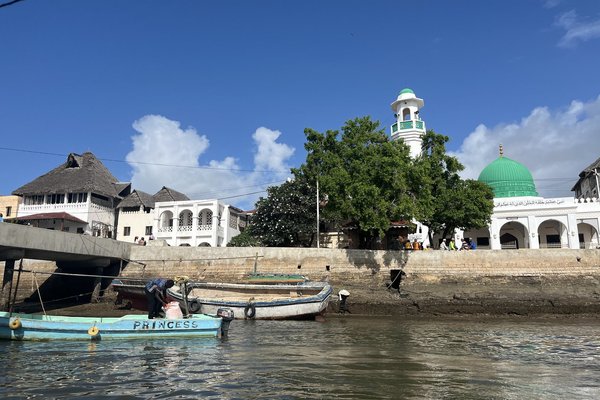Kenya
Lamu Old Town
Lamu Old Town is the oldest and best-preserved example of Swahili settlement in East Africa.
The town has retained its authentic building fabric up to the present day, with cultural influences from Europe, Arabia, and India. As a conservative and closed society, Lamu has an important religious function with annual celebrations and is also a significant centre for education in Islamic and Swahili culture.
Community Perspective: aimlessly wandering around the old town seems the thing to do.
Site Info
Official Information
- Full Name
- Lamu Old Town (ID: 1055)
- Country
- Kenya
- Status
-
Inscribed 2001
Site history
History of Lamu Old Town
- 2001: Inscribed
- Inscribed
- Type
- Cultural
- Criteria
- ii
- iv
- vi
Links
- UNESCO
- whc.unesco.org
- Official
-
- museums.or.ke — Lamu Museum
All Links
UNESCO.org
- whc.unesco.org — whc.unesco.org/
Official Website
- museums.or.ke — Lamu Museum
News Article
- June 27, 2019 bbc.com — Kenya halts Lamu coal power project
- Aug. 17, 2018 kenyans.co.ke — Lamu Old Town Bans Boda Bodas to Preserve World Heritage Site
- July 5, 2018 the-star.co.ke — Why Lamu Old Town risks losing Unesco World Heritage status
- Aug. 15, 2017 africanindy.com — Lamu coal power plant would be a deadly mistake for Kenya
- Aug. 29, 2015 huffingtonpost.com — In Kenya, Proposed Coal-Fired Power Plant Threatens Lamu
- July 29, 2015 allafrica.com — Lamu Old Town Will Only Allow Donkeys
- Feb. 22, 2014 the-star.co.ke — Lamu heritage site to receive major facelift
- Feb. 25, 2010 frostillustrated.com — Lack of fresh water threatens Lamu
- Oct. 4, 2009 nation.co.ke — Lamu cultural sites set to get a lifeline
- July 25, 2009 nation.co.ke — Investors scramble for Lamu prime land
Community Information
- Community Category
- Urban landscape: African
Travel Information
Recent Connections
-
Perfect Inscriptions
2001 -
Bazaars and Market Halls
Covered Market -
Prison
Lamu Fort: "It was used as a military f…
Connections of Lamu Old Town
- Individual People
-
-
Zheng He
"There are some accounts that mention Chinese ships of Zheng He's fleet sinking near Lamu Island in Kenya in 1415. Survivors are said to have settled in the island and married local women. However, the authenticity of this story is disputed." (Wiki); "the Chinese are confident they'll uncover a Ming-era wreck near the Lamu archipelago, where bits of Ming ceramic ware have surfaced in the past, and that it will be their legacy that gets burnished when they find it. A team of Chinese archaeologists is expected to commence work in July (2010)". Read more at linkSee www.time.com
-
Sir Wilfred Thesiger
1961See prmprints.com
-
- Geography
-
-
Swahili culture
the oldest and best-preserved Swahili settlement in East Africa (brief descr) -
Indian Ocean
-
- Trivia
-
-
Built or owned by Omanis
"Lamu invited Seyyid Said Ibn Sultan-al-Busaidi, the Sultan of Oman, to install a garrison to protect the town, leading to the construction of the Fort, which was completed in 1821. ... " (AB ev) -
Built or owned by British
Buildings along sea front built during British rule -
Built or owned by Germans
The old German Post Office in Lamu dates back to 1881
-
- History
-
-
Fusion
"The town is characterized by narrow streets and magnificent stone buildings with impressive curved doors, influenced by unique fusion of Swahili, Arabic, Persian, Indian and European building styles."See whc.unesco.org
-
Omani Sultanate of Zanzibar (Zanj)
"In the 1880s the Sultan of Zanzibar was granted the islands of Zanzibar, Maria, Pemba, and Lamu, and a strip of the mainland up to Kipini in the north" (AB ev)
-
- Ecology
-
-
Mangroves
"The gazetted area... extends to the east across the water to Manda Island, where both the mangrove forest and the skyline are protected." (AB ev)
-
- Architecture
-
-
Earth Architecture
"The section consisting of MUD-BRICK BUILDINGS covers an area of some 21ha" (AB ev) -
Wooden architecture
Built in mangrove timber -
Vernacular architecture
"the vernacular buildings are internally decorated with painted ceilings, large niches (madaka), small niches (zidaka), and pieces of Chinese porcelain." (OUV) -
Coral Masonry
The old town centre consists of large houses built in coral stone and mangrove timber. (AB ev)
-
- World Heritage Process
-
-
Perfect Inscriptions
2001
-
- Religion and Belief
-
-
Notable mosques
Riyadha Mosque 1880 -
Notable mosques
Pwani Friday Mosque (origins claimed back to 1370)
-
- Human Activity
-
-
Festivals
"a significant centre for education in Islamic and Swahili culture as illustrated by the annual Maulidi and cultural festivals" (OUV) -
Sea Ports
-
Reclaimed land
"During the British rule many houses were built on the reclaimed seafront" (AB ev) -
Slavery
In the Omani Period, "slaves were used to maintain plantations... Until the end of the 19th century the population contained a large number of slaves providing cheap labour and living both in the hinterland and in households". (AB ev)
-
- Constructions
-
-
Bazaars and Market Halls
Covered Market -
Prison
Lamu Fort: "It was used as a military fortress until 1910 when the British colonial government reorganized it as a prison." (wikivoyage)
-
- WHS on Other Lists
-
-
World Monuments Watch
Swahili Coast Heritage Sites, Comoros, Kenya, Mozambique, Tanzania (2025)See www.wmf.org
-
U.S. Ambassadors Fund
Restoration of the Early 19th-Century Fort at Lamu (2010), Preservation of Cultural Patrimony in Lamu (2008) -
World Monuments Watch (past)
Lamu Old Town (2014)See www.wmf.org
-
Important Shark and Ray Areas (ISRAs)
Lamu Archipelago: Western Indian Ocean (ISRA Region 07)
-
- Timeline
-
-
Built in the 13th century
"continuously been inhabited for over 700 years", "From the 13th to the 15th century there were over a hundred city states along the east coast, but most of these have either fallen into ruins or have been transformed into modern towns. In Kenya, Mombasa, Malindi, Witu, Faza, and Lamu continue to exist;" (AB ev)
-
News
- bbc.com 06/27/2019
- Kenya halts Lamu coal power project
- kenyans.co.ke 08/17/2018
- Lamu Old Town Bans Boda Bodas to P…
- the-star.co.ke 07/05/2018
- Why Lamu Old Town risks losing Une…
Recent Visitors
Visitors of Lamu Old Town
- alicemears
- amychemu
- Aspasia
- Atila Ege
- Carlos Sotelo
- Els Slots
- fedemarch92
- Harry Mitsidis
- Iain Jackson
- Knut
- ko9757
- Krijn
- Lindaflat
- Luis Filipe Gaspar
- Michael Ayers
- Michael Novins
- Mihai Dascalu
- Morodhi
- Nihal Ege
- Paul Schofield
- Peltzi
- Potsdamer
- Randi Thomsen
- Roger Ourset
- Roman Bruehwiler
- stephanvermeulen
- Svein Elias
- Szucs Tamas
- Thomas Buechler
- Thomas van der Walt
- Timothy C Easton
- Vanessa Buechler
- Vernon Prieto
- Zoë Sheng
Community Reviews
Show full reviews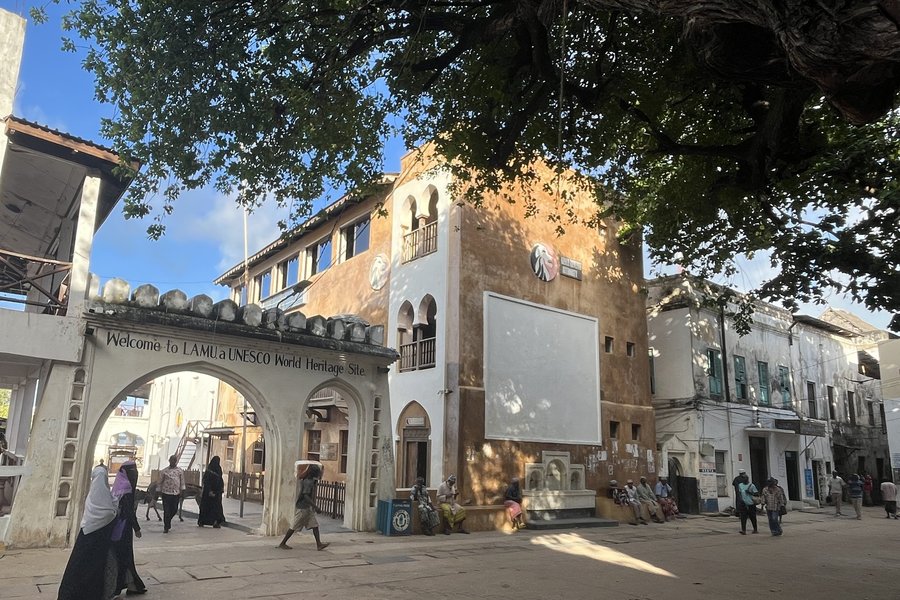
I stayed for two nights in a renovated traditional house along one of the narrow alleyways of the Old Town of Lamu. I enjoyed being woken up by the call to prayer (this is a conservative Islamic society) and having a hearty Swahili breakfast in the morning. Due to the thick walls, my room was quite dark all day, but a breeze and vitamin D (handy for the muslim ladies who in the past weren’t allowed to get out) is provided in these houses by the interior courtyard, open-air sitting areas and a rooftop terrace. It wasn’t easy to get into such a house in the past – there’s a massive wooden front door plus an attached waiting area outside (pictured). Many such houses still exist in the Old Town, often bought by foreigners since they are too expensive for locals (not only the purchase but also the renovations and the upkeep).
I walked the town’s streets many times, once also with a private guide. The starting point is the central square, which lies behind the white ‘Welcome to Lamu, a UNESCO World Heritage Site’ arches and in front of Lamu Fort. The fort was built at the coast, but there is now a block of buildings and a corniche in between on land reclaimed from the sea during the British period. The square is a popular meeting place and there are benches all around for (mostly) men to linger about.
From here you can walk into the two …
Keep reading 0 comments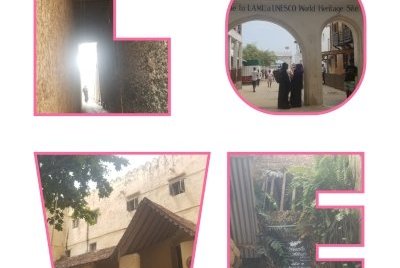
Ignore my pictures.I tried to get the collage to do LAMU but that didn't work after all so now it's like a Central America facade every town spells out. It should really be "LAME" though.
I flew in from Nairobi which is almost daily. You can also fly from Mombasa and Malindi, with a few other smaller towns as less frequent opens. I was originally going to drive up to see things on the way but the mainland town won't be safe for your car and you'll waste money hiring it for that long anyway, not to mention then drive back down south to return the car. When you arrive by plane you get on a ferry (public is 200sh at 2024 rate) or a private boat for 500 especially necessary if you staying at Shela. Usually a hotel will arrange meetup. Staying at Lamu has several choices. The seafront hotels are a safe bet and they have restaurants too. I stayed at a smaller one that was still clean and spacious. I am not sure I want to recommend staying in Lamu though. As a foreigner you are going to spend more time in Shela as that's where the restaurants are, bars and it's much cleaner. The prices on the island are higher than the rest of Kenya but that seems normal. Shela, by the way, is very touristy with Maasai vendors, boat and motorbike rentals and all the entertainment you are looking for. There is nothing in …
Keep reading 0 comments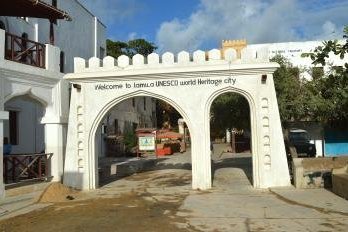
In August 2016, I flew on Airkenya Express from Nairobi to Lamu. I ignored at my peril the admonishment on Airkenya's ticket to only travel with soft-sided luggage. Airkenya apparently runs an ancillary business selling soft-sided luggage to tourists as they immediately offered to sell me a duffel bag, in which I repacked my belongings, and they stowed my hard-sided suitcase until my return. (I ended up donating the Airkenya-branded duffel bag later in my trip to the guide who accompanied me during my visit to Kibera, the largest slum in Nairobi, so it was money well spent.) Lamu Airport is located on an island across the channel from Lamu's old town, and ferries await arriving passengers for the 10-minute crossing. I stayed at Subira House, which was built 200 years ago by the governor of the Sultan of Zanzibar (http://www.subirahouse.com). Due to Lamu's proximity to Somalia and some recent incidents, there were very few tourists in Lamu and I was the only guest at Subira House. The highlights in Lamu were wandering around the old town, visiting the Donkey Sanctuary, which works to improve the health and condition of Lamu's principal means of transport (https://www.thedonkeysanctuary.org.uk/project/lamu), and eating and drinking at Peponi Hotel in nearby Shela village (http://www.peponi-lamu.com).
Keep reading 0 comments
Other than for its population of 5,000 donkeys roaming the narrow streets among kanzu-clad men and women in flowing buibui robes and 40 mosques, Lamu looks like any other ancient Islamic town. The only motor vehicles in the ancient centre are a Land Rover belonging to the District Commissioner and a tractor owned by Lamu County Council.
Yet Lamu is a Mecca of sorts. More than 20,000 Muslims visit Lamu annually to mark the holy Maulidi Festival that also attracts tourists from East and Central Africa, Europe, North America, the Indian sub-continent and the Middle East every August.
Keep reading 0 comments
Lamu is an own world, little planet by itself. Time runs slower, the heat forces You to a slower path. The streets so narrow that no car can pass, but still, look out not to be overrun by a donkeytransport. Its like Africa 100 years ago, with some mix in of the 21th century. People of all tribes can be seen in town, if lucky even half bare-breasted Maasai-woman may walk down the beach front, with all her traditionel jewellery around her neck. Bearded black arabs with their "Fez", totally black muslim woman with only their eyes visible and less conservative swahili woman with their colourful dresses add a special touch to street life. Now, in may 2005, there are few tourists and the beach-boys try every trick to get a little busyness off You. Tell them very clear "sitaki" ( I dont want") and then "salama" (go in peace). Dont take a map in Your hand, otherwise You have instantely a crowd of young men arround you offering help, You ount get rid of them! But the ambiance of the town is unique - its the place to shoot those pictures one uses for this expensive high glance calendars, the place where lovers pass hoeny-moon, as we did ....
Keep reading 0 comments
